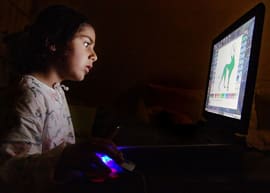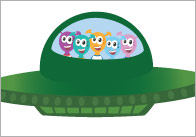The Genius of Children in Role-Play

I, like millions of other people, have got a smartphone. In many ways it has changed my working life: I can respond to emails when they arrive, I can receive and respond to texts immediately, and I have access to the internet wherever there is coverage from my network. At first I was totally hooked: every time my phone made a buzzing noise I just had to look at it. Could it be someone sending me an important email? Maybe it was a text from a friend? Often it was just an email from a prince in a distant country inviting me to take part in a lucrative business proposition, or a ferry company or hotel chain reminding me of my chance to have 15% off their latest deal. Once I got over the novelty of the phone, I soon found it a bit irritating. I’m not hooked anymore, but I still can’t resist the urge to look at it regularly… just in case.
Unfortunately, the millions of other people with smartphones may not have reached the same stage as me in their relationship with their handset. Maybe that’s why everywhere you look at people –in cafes, pubs, supermarkets, in the street, on their bikes even, you will see them looking at their smartphones. Some of these millions of people attend my courses, and although I ask everyone to put their phones on silent, I know it must be difficult for them to resist a quick peek during workshop activities.
But I think I have seen everything now. I was sharing a storybook with a four- year-old boy recently. I was doing my best to make the story of The Gingerbread Man utterly gripping and memorable. Just as our biscuity hero was about to meet his grisly fate in the mouth of the sly fox, the little boy reached into his pocket and pulled out a small rectangular wooden block, looked at it, stabbed at it a few times with his finger, put it back in his pocket and then carried on listening to the story.
“What are you doing?” I asked. “It’s allright: I was listening, I was listening”, was his reply. “I was just checking my emails.”
There are two ways of looking at this little episode: either the world has finally gone mad, or this little boy is a brilliant role player. After I had got over my surprise, I realised that the little fellow was just doing what we hope all children will do: making sense of what he sees and experiences by acting it out in role play.
Children use role play to act out activities and routines that impress them, and in some cases confusing events that they are trying to make sense of. Very young children watch adults involved in daily activities around the home, and are attracted to the objects that mum and dad regularly use, and particularly if they have actions and noises associated with them. That’s one possible reason why toddlers want to open and shut cupboard doors and drawers, play with the washing machine, open the bin and take everything out from under the sink. ‘High status’ objects such as Mum’s mobile phone and the TV remote control are the most exciting, because children will have been told not to touch them!
As adults we know that role play is valuable for children’s language development, social skills and to increase their knowledge and understanding of the world. We even set up special areas in our classrooms and settings so that children can engage in this valuable play. Perhaps, like me, you feel a little despondent when you see children in the home corner sitting in front of a cardboard box pretending they are watching TV, or role-playing catching up with their emails at a pretend computer. Surely they could be making cups of tea, cooking a dinner or doing the washing up?
I put this point to Judith Twani, an experienced teacher, early years advisor and provider of inspirational training, (what that woman can turn a cardboard box into is no one’s business!) Judith does not think that this little boy’s role play was a sign that parents these days spend too much time on phones, at the computer and generally ignoring their children. Judith opened my mind to the ways that we can encourage role play. Observe a group of children outside playing on the bikes. Yes, we can view this as an opportunity for physical development and for children to ‘let off steam’. But look and listen more closely and you will observe that children are acting out what they see and know: filling up their cars with petrol (“No Michael,” one boy told me, “It’s not petrol. I’m driving a van, like my dad, and he puts in diesel”.) They are making manoeuvres: “Beep, beep, beep! Watch out! I’m reversing my lorry”; talking with each other: “Wait there. Call me on your mobile and I’ll pick you up in my taxi”; and even learning about car insurance: “You’ve just bashed my car. That’s going to cost a fortune. It was your fault!”
So if you are reading this blog post on a smartphone, that’s fine. If you are supposed to be listening to a speaker on a training course, get back to work!! The post will be there at the break. Just make sure you Tweet it to your friends, forward it by email and share it on Facebook…
Let’s Get Talking! Exciting ways to help children with speech and language difficulties by Michael Jones & Jo Belsten is available from www.lawrenceeduational.co.uk. To find out about Judith Twani’s inspirational training visit //www.talk4meaning.co.uk/talk4meaning-people/judith-twani/
Comments
Leave a Reply
Popular Teaching Resources
Stay Up To Date
Sign up for our newsletter and we’ll let you know when we create new early years resources.






What an interesting and thought provoking post. Thank you. I am not sure that I share the ocnfidence of Judith or the view that this particular boy was role playing, and therefore, his actions understandable and more the norm, than we may care to think.
A wider matter and one not addressed here, is the ability of children to engage with others, with tasks that are presented, with learning opportunities and experiences. That ability to filter out the outside world and focus attention, even for the short duration of a story told, is something that seems increasingly more demanding for many of our young children.
Sad the day when we need to begin story time with a reminder to children – not just adults attending workshops – to put that phone on silent..
I agree with HMStack
only today a parent told me that his son aged four when he wakes up in the morning he plays with an IPad,they have shown him how so he does not disturb them. My children if they woke up too early would look at books or play with their toys in their bedrooms. I run a pre-school and I can tell you that in the last few years children can not sit still for a story or at circle time. Lots of teachers will say the same.
Lots of interesting stuff here (as ever). Yes, phones are a real part of role play – whatever it is – at Woodlands. Also, I was told on the way home from school how the child was going to tell Daddy stuff on facetime later (he works away a lot.) Yes, I SO agree with children’s inability to focus and maintain attention. It is on two of my learning journeys this term and for it to be there shows how underpinning it is to everything else.
However, the ability of children to notice and carry out these details of parents’ and carers’ lives is lovely and to be celebrated – in fact I must put a song about it on my next CD! One child, on going out for a walk with a doll in the buggy, had to get a bag into which she put her phone and purse first. She is quiet, with quite late emerging vocal language but look at what is being observed and absorbed and acted out. A pencil is generally considered a safe item yet if sharp and stabbed in an eye it could be very nasty. Is it not the way with phones and so much more? Let us celebrate these things’ values and minimise the way they take over inappropriately in our settings and homes..